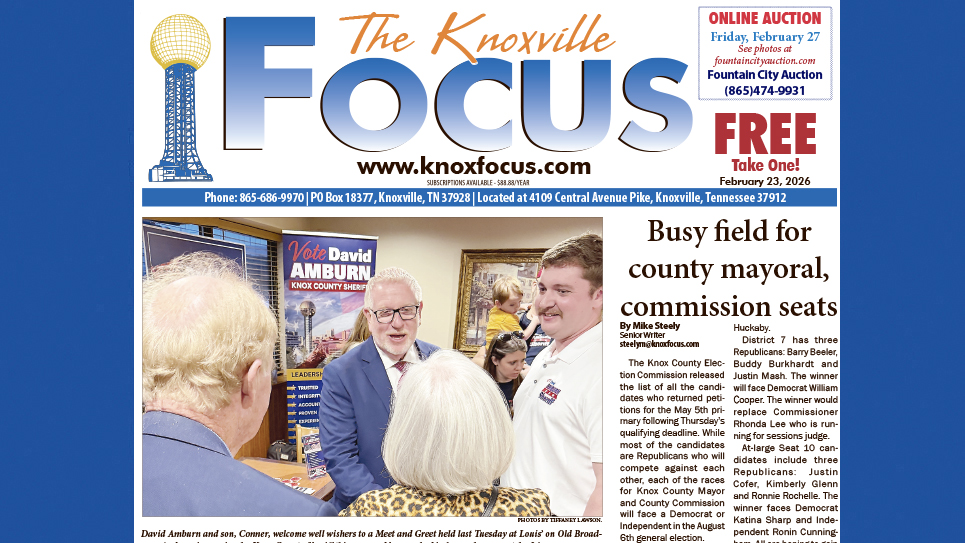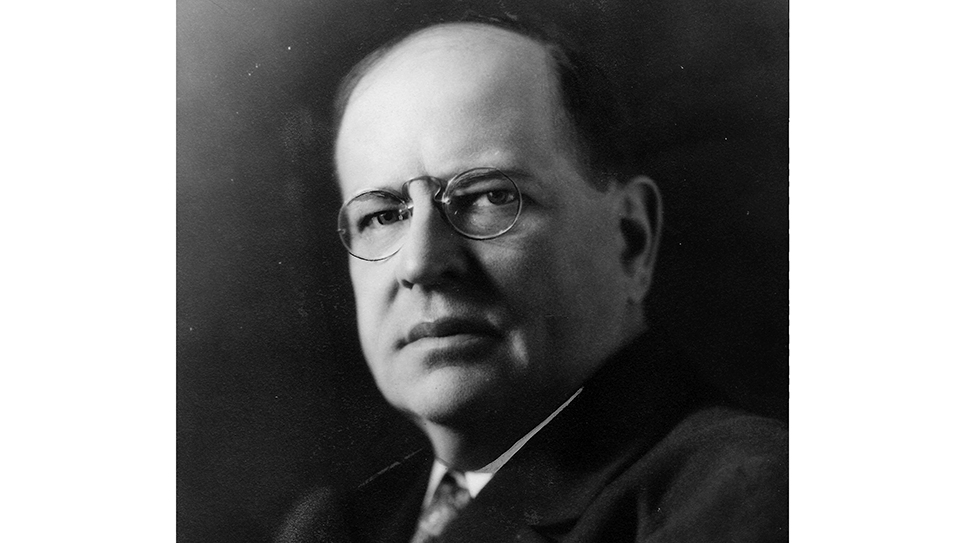The Gentleman From Maryland
Senator John Marshall Butler
By Ray Hill
Today, with the occasional exception, Maryland is a solidly Democratic state, especially on the federal level. The last time a Republican was elected to the United States Senate from Maryland was 1980, when Senator Charles “Mac” Mathias was reelected. During the decade of the 1950s, the Free State had two Republicans representing it in the U.S. Senate. Most of the Republicans who got elected to public office in Maryland were more moderate than solidly conservative. The exception, at least to some degree, was John Marshall Butler. When referred to as a member of the “Old Guard,” Butler retorted that being so was as “American as baseball.”
As befitting an able lawyer, Butler told one interviewer, “I felt I represented the conservative constitutional element of the party. I’m a constitutionalist. I thought the liberal elements were straying pretty far from the concept of constitutional government that had been taught me. And I therefore resolved to expend every effort to bring the government back to government by the precepts of the Constitution as I understood them.”
When the former senator died, the Baltimore Evening Sun published an editorial acknowledging Butler’s controversial first campaign, which the newspaper described as having been won due to “a shamefully manufactured smear against” the incumbent. Yet the Evening Sun stated it was frequently overlooked that Senator Millard Tydings “had dangerously neglected his Maryland political roots” and made himself vulnerable to a serious challenger. As a person, “not even liberals who knew John Butler could bring themselves to dislike him,” the newspaper admitted. “His views were rigidly orthodox, his creativity limited,” the editorial stated, but Butler was also a man who possessed “a warm human touch and a personal straightforwardness which caught and held the affection even of those profoundly in disagreement.” The Evening Sun editorial readily confessed the newspaper had never been politically friendly to Senator John Marshall Butler, yet found him to be “a man of principle, a man who said what he believed, a man unswayed by popular winds.” “Winning politics and flinty honesty do not often go together,” the editorial insisted, “John Butler managed both.”
Doubtless, the key to Butler’s popularity with Marylanders came from his reputation as a “service” senator. The Baltimore Sun praised Senator Butler for his “real public service lay in protecting his constituents’ interests, not in the great national and international issues of his day.” Rather, Butler was a senator “who paid close attention to the interests of his state, particularly to its economic linchpin, the port of Baltimore, its shipyards, and the American merchant marine.” Many senators, feeling the weight of the world upon their shoulders, were beaten in the next election simply because they seemed to forget the worries of the folks back home.
Butler’s intense devotion to Maryland’s interests was described by the shipping correspondent for the London Times, who thought the senator was “the foremost champion in the United States Senate of the American shipping and shipbuilding industries.”
Tall, erect, a man of striking personal appearance, John Marshall Butler looked like a United States senator. At 14, John M. Butler sold newspapers and got a job in a mattress factory, and earned money to send himself to Johns Hopkins University and the University of Maryland Law School. Butler married Mary Louise Abell, whose great-grandfather had helped to found Baltimore’s Sun newspapers. During his time in college, Butler was both a scholar and an athlete. Butler’s education was interrupted by his service in the First World War, where he enlisted in the 110th Field Artillery of the 29th Division. Upon returning home to Maryland, he returned to his studies but had to quit again to help his ailing father in the elder Butler’s real estate business. John M. Butler studied law at night and earned a degree from the University of Maryland Law School. Butler joined the firm of Venable, Baetjer & Howard, becoming a partner in 1939.
Prior to 1950, John Marshall Butler had enjoyed the life of a successful and prosperous attorney. The Butlers had three children, two boys and a girl, and Butler’s only public service was as a member of Baltimore’s Civil Service Commission. Few gave Butler much of a chance to defeat the venerable and formidable Millard Tydings in 1950. Even Franklin D. Roosevelt had found it impossible to dislodge Tydings from the Senate. Senator Tydings had been one of the more conservative Democrats who had incurred the displeasure of President Roosevelt. Roosevelt sponsored Congressman David Lewis to challenge Tydings inside the Democratic primary in 1938 and visited the Free State to speak on his behalf. FDR was embarrassed when Tydings won handily.
“McCarthyism versus communism was the only real issue that I ran on in 1950,” Butler told a reporter two decades after the campaign.
The 1950 Senate race in Maryland would become infamous and would color much of Butler’s reputation, especially with the political Left. The Butler campaign received assistance from Senator Joe McCarthy of Wisconsin, who utilized the services of some rather shady people who contrived to publish a photo showing Senator Tydings apparently listening to Earl Browder, leader of the American Communist Party. The photo was a composite, meaning two separate photographs were put together as if they were one. An extensive and exhaustive investigation following the election revealed that there were many things done by the McCarthy group without the approval or knowledge of John Marshall Butler.
Butler began the 1950 campaign as an unknown and faced David John Markey in the GOP primary. Markey had been the Republican nominee for the U.S. Senate in 1946 and quite nearly beat Governor Herbert O’Conor, losing only by 2,232 votes out of more than 470,000 cast. John M. Butler actually lost the popular vote in the Republican primary to Markey by 1,889 votes, but as Maryland used a county unit system to determine the winner (rather like the Electoral College), Butler won the nomination.
The 1950 elections were rough on a number of Democrats seeking reelection to the United States Senate. Both the majority leader and majority whip were defeated in reelection bids, but perhaps the biggest political upset of the night was John M. Marshall Butler’s victory over Millard Tydings by more than 43,000 votes. It was a GOP year in the Free State in 1950, with Theodore McKeldin, a Republican who had been popularly elected as the mayor of Baltimore, winning the governorship. McKeldin was a more moderate Republican, and the two men would find themselves on opposite ends of the fight between Senator Robert A. Taft of Ohio and Dwight D. Eisenhower for the Republican presidential nomination in 1952. Governor McKeldin backed Ike while Senator Butler touted his friend Bob Taft.
Senator Tydings challenged the result of the election, seeking to oust Butler from the Senate for having used unfair means to defeat him. The Senate, controlled by Democrats, seated John M. Butler.
As a member of the U.S. Senate, John Marshall Butler was a staunch anti-communist, sponsoring the Communist Control Act, which would have outlawed the Communist Party in the United States. Butler’s bill would also have allowed those organizations infiltrated by Communists to be prosecuted. Senator Butler was a strong supporter of the Constitution amendment proposed by his colleague, John W. Bricker of Ohio, which would have limited the president’s authority in foreign affairs by requiring the approval of the Senate for some executive agreements.
Senator Butler was a conservative during his time in the United States Senate on the national issues coming before that body. Butler supported civil rights as he believed every person had the right to vote under the Constitution. The senator was insistent that taxpayers receive fair value for the expenditure of their tax dollars. Plain-spoken, Butler was never shy about expressing his views, but his concentration upon the parochial interests of his state made him popular with Marylanders and a difficult target for Democrats. There was hardly any industry important to Maryland that did not receive help from Senator Butler and his office during his 12 years in the Senate. Butler was also highly popular amongst some unexpected groups, like the longshoremen, due to his support for the shipping industry, so vital to the Maryland economy.
His defeat in the 1950 election rankled Millard Tydings, who never got over his loss. The former senator resolved to try and win back his seat in 1956 with both men girding for a bitter rematch. Tydings only narrowly beat George Mahoney, a contractor who had lost two races for the U.S. Senate and two gubernatorial races. Mahoney was something of a force to be reckoned with and would remain so for the better part of two decades. George Mahoney had a strong appeal for working-class Democrats, and while Tydings was no born aristocrat, the former senator certainly had, over the years, acquired something of a lordly manner and lived that way as well. Tydings and his wife, the daughter of former ambassador and attorney Joseph Davies, who had been married at one time to the richest woman in the world, Marjorie Merriweather Post, heiress to the cereal fortune, lived on a large estate in Havre de Grace, Maryland.
Tydings was stricken with what was publicly announced as an attack of shingles, but was actually encephalitis, an inflammation of the brain. Tydings gave up the Democratic nomination, which was then won by George Mahoney. Senator Butler ran in tandem with the reelection campaign of President Eisenhower and beat Mahoney by over 50,000 votes.
By 1962, Senator John M. Butler was tiring of political life. Every indication pointed to his being able to win a third term in the Senate if he ran. Troubled by a few physical ailments, the 65-year-old Butler announced he would not seek reelection. Butler’s announcement in December 1961 stunned his own party and Maryland Democrats as well. Senator Butler mysteriously said “compelling personal reasons” had caused him to come to the decision not to run again. Butler had earlier suffered from a virus that doctors had a difficult time managing, while the senator had a fever that ran as high as 105 degrees. “My eleven years in the Senate have been the most satisfying of my life,” Butler said in a statement to the press.
Maryland Republicans were panicked by the idea that Senator Butler would not run again and begged him to reconsider. Newspapers reported the senator was giving thought to becoming a candidate again. Shortly before the filing deadline, Senator Butler reiterated his decision not to seek reelection. “I must abide by my decision,” the senator said. Free State Republicans had hoped Butler would run again, along with former governor Theodore McKeldin, seeking to return to the statehouse. McKeldin, away in New York to make a speech, told a reporter Senator Butler’s decision not to run again “makes the prospects for me less attractive.”
In 1964, former Senator John M. Butler accepted the post of state chairman for Maryland of Barry Goldwater’s presidential campaign. Butler and Goldwater had served for a decade together in the U.S. Senate.
After his retirement, Senator and Mrs. Butler moved to a condominium in Cross Keys Village, where he enjoyed playing gin rummy and still occasionally made speeches at Republican get-togethers.
While still practicing law, the former senator was interviewed by a reporter and observed, “The electorate is so much more fragmented now, and things are a lot more emotional, too. I would think it would be a lot harder to run for the Senate now.” Butler disliked the idea of special interest groups and how candidates for public office had to try and woo them to win an election. “I said what I thought, and they either voted for me or not,” Butler said.
The former senator and Mrs. Butler traveled by automobile to St. Simon’s Island off the coast of Georgia, where they enjoyed a vacation in March 1978. The couple was on the way back to Maryland when they stopped off at a Rocky Mount, North Carolina, hotel. Once in the hotel room, John Marshall Butler suffered a massive heart attack and died.
© 2025 Ray Hill







